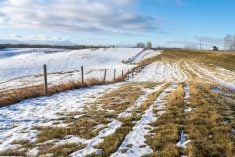An upcoming clubroot conference is a reminder of the seriousness of the disease, but also a celebration of how research contained and helped farmers control the disease.
While clubroot is still a serious canola disease, research has given farmers, municipalities and agronomists a better understanding of how to deal with it, said Clint Jurke agronomy specialist with the Canola Council of Canada.
“Canadian researchers are now leaders in researchers in the world. Our understanding of the disease is unsurpassed in the world,” said Jurke, of Lloydminster.
Read Also

Federal budget draws mixed reaction from Canadian agriculture groups
The 2025 federal budget took a step forward in recognizing agriculture’s importance but failed to address pressing challenges like labour disruptions, interswitching and precision technology, say Canadian farm groups.
Jurke points to $4 million of federal government funding provided to the Clubroot Risk Mitigation Initiative early in the disease’s discovery to help researchers understand the disease and control its spread.
Despite new discoveries in Saskatchewan and Manitoba, clubroot will become a lot like blackleg, with low levels of the disease in the fields.
“This disease is going to change and challenge us and spread to Saskatchewan and Manitoba,” he said.
“We are finding it in Manitoba which means the disease spreading more quickly than anyone anticipated.”
Because of new clubroot-resistant varieties, more knowledge of how the disease is spread and how to scout for the disease, Jurke doesn’t anticipate the large-scale outbreaks found in Alberta in 2007 and 2008 where farmers lost entire fields of canola to the disease.
“Clubroot will continue to spread, but I think we can get to the point where we can prevent huge yield losses. We don’t see those out breaks happening because of resistant varieties and how to scout for it,” he said.
“That is where the research has gotten us.”
The International Clubroot Workshop June 19 to 22 hopes to bring scientists, farmers, municipalities and oil industry staff together to discuss the latest research on clubroot.
The first day will be “hard core” technical information on the disease. Day two will be more broad based information for farmers, or anyone who comes into contact with farm soil, including oil industry staff who can play a role in preventing the spread of the disease.














